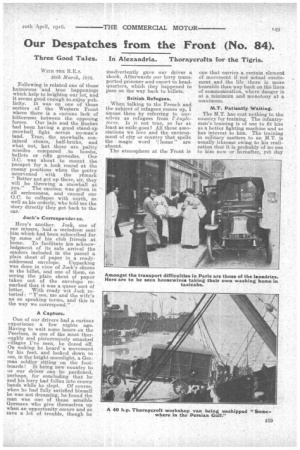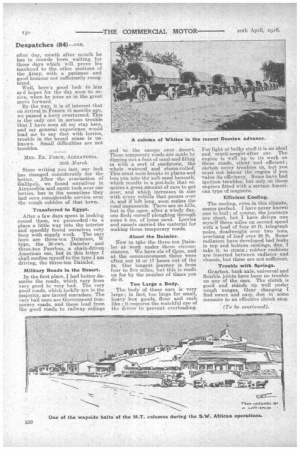Our Despatches from the Front (No. 84).
Page 7

Page 8

If you've noticed an error in this article please click here to report it so we can fix it.
In Alexandria. Thornycrofts for the Tigris. Three Good Tales.
WITH TEE R. E. s.
26th March, 1916.
Following is related one of those humorous -and true happenings which help to brighten our lot, and it seems good enough to-enjoy publicity. it was on one of those sectors of the Western Front where there is a curious lack of bitterness between the opposing forces. Our lads and the Roches had been having a good stand-up snowball fight aeroas no-man's land. True, the snowballs contained stones, half-bricks, and what not, hut those are paltry missiles compared . to bombs, bullets or rifle grenades. Our 0.0. was about to mount the parapet for a look round at the enemy positions when the sentry intervened with the rtmark "Better not get up there, sir, theywill be throwing a snowball at you." The caution was given in all seriousness, and caused our 0.0. to collapse with mirth, as well as his orderly, who told me the story directly they got back to the car.
Jock's Correspo %der cc.
Here's another. Jock, one of our miners, had a melodeon sent him which had been subscribed for by some of his club friends at home. To facilitate his acknowledgment of its safe arrival the senders included in the parcel a plain sheet of paper in a readyaddressed envelope. Unpacking was done in view of Jack's chums in the billet, and one of them, on seeing the plain sheet of paper taken out of the envelope remarked that it was a queer sort of letter. With ready wit Jock retorted: "Y'see, me and the wife's no on speaking terms, and this is the way we correspond." •
A Capture.
One of our drivers had a curious experience a few nights ago. Having to wait some hours on the Peerless, in one of the most thoroughly and picturesquely smashed villages I've seen, he dozed off. On waking he heard-a movement by his feet, and looked down to see, in the bright moonlight, a German soldier sitting on the footboards ! It being new country to us our driver can be pardoned, perhaps, for concluding that he and his lorry had fallen into enemy hands while he slept. Of course, when he had fully satisfied himself he was not dreaming, he found the man was one of those sensible Germans who give themselves up when an opportunity occurs and so save a lot of trouble, though he
inadvertently gave our driver a shock. Afterwards our lorry transported prisoner and escort to headquarters, which they happened to pass on the way back to billets.
British Refugees.
When talking to the French and the subject of refugees comes up, I amuse them by referring to ourselves as refugees from l'Angieterre. Is it not true so far at least as exile goes I All those associations we love and the environment of city or country that spells the magic word home" are absent.
The atmosphere at the Front is one that carries a certain element Of • movement if not actual excitement and the life there is more bearable than way back on the lines of communication, where danger is at a minimum and monotony at a maximum.
M.T. Patiently Waiting.
The M.T. has cost nothing to the country for training. The infantryman's training is of use to -fit him as a better fighting machine and so has interest to him. The training in militaryMatters to an M.T. is usually irksome owing to his realization that it is probably of no use to him new or hereafter, yet day
after day, month after month he has in crowds been waiting for those days which will prove his manhood to the othei sections of the 4rmy, with a patience and good humour not sufficiently recognized.
Well, here's good luck to him ard hopes for the day soon to arrive, when he joins us in the great move forward.
By the way, it is of interest that on arrival in France 15 months ago, we passed a lorry overturned. This is the only one in serious trouble that I have seen all my stay here, and my general experience would lead me to say that with lorries, trouble in the broad sense is unknown. Small difficulties are not troubles.
MED. Ex. FORCE, ALEXANDRIA.
26th March.
Since writing you last, our luck has changed considerably for the better. After the evacuation of Gallipoli we found ourselves in Alexandria and again took over our lorries, but in the meantime they had seen considerable service over the rough cobbles of that town.
Transferred to Egypt.
, After a few days spent in looking -round them, we proceeded to place a little way into the interior and speedily found ourselves very buy with supply work. The cars here are three-ton Daimlers, W type, the 30-cwt. Daimler and three-ton Peerless, a. chain-driven American ear, but in this letter I shall confine myself to the type I am driving, the three-ton Daimler.
'Military Roads in the Desert.
In the first place, I had better describe the roads, which, vary from very good to very bad. The very good roads, which luckily are in the majority, are tarred macadam. The very bad ones are Government tem-porary roads, and these lead from the good roads to railway sidings and to the camps over desert: These temporary roads are inadc by digging out a foot of sand and filling in with a sort of sandstone, the whole watered and steam-rolled. This crust soon breaks in places and lets you into the Soft sand beneath, which results in a pot-hole that requires a great amount of care to get over, and which increases in size with every vehiele that passes over it, and if left long, soon makes the road impassable. There are no hills, but in the open, after a windy day, one finds oneself ploughing through some 6 ins, of loose sand. Lorries and camels carried the material for making these temporary roads.
About the Daimler.
Now to take the three-ton Daimler at work under these circumstances. We have six of them, and at the commencement the-se were often out 16 or 17 hours out of the 24. Our longest journey is from four to five miles, but this is made up for by the number of times you do it.
Too Large a Body.
The body of these ears isvery large ; in fact, too large for small, heavy box goods, flour and such like ; it requires the watchful eye of the driver to prevent overloading. For light or bulky stuff it is an ideal and mucli-sought-after car. The engine .is well up to its work on these roads, silent and efficient ; Carbon never troubles us, but you must not labour the engine if you value its efficiency. Some have had ignition troubles, but only on those engines fitted with a certain American type of magneto.
Efficient Cooling.
The cooling, even in this climate, seems perfect. I have never known one to boil ; of course, the journeys are short, bull have driven one myself three miles on second speed with a load of four 40 ft. telegraph poles, deadweight over two tons, overhang of load over 20 ft. Some radiators have developed bad leaks in top and bottom castings, due, take it, to strain ; rubber cushions are inserted between radiator and chassis, but these are not sufficient.
Trouble with Springs.
Gearbox, back axle, universal and flexible joints have been no trouble on any of the cars. The clutch is good and stands up well under rough usages. Gear changing I find sweet and easy, due in some measure to an effective clutch stop.
(To be corttinved).r






















